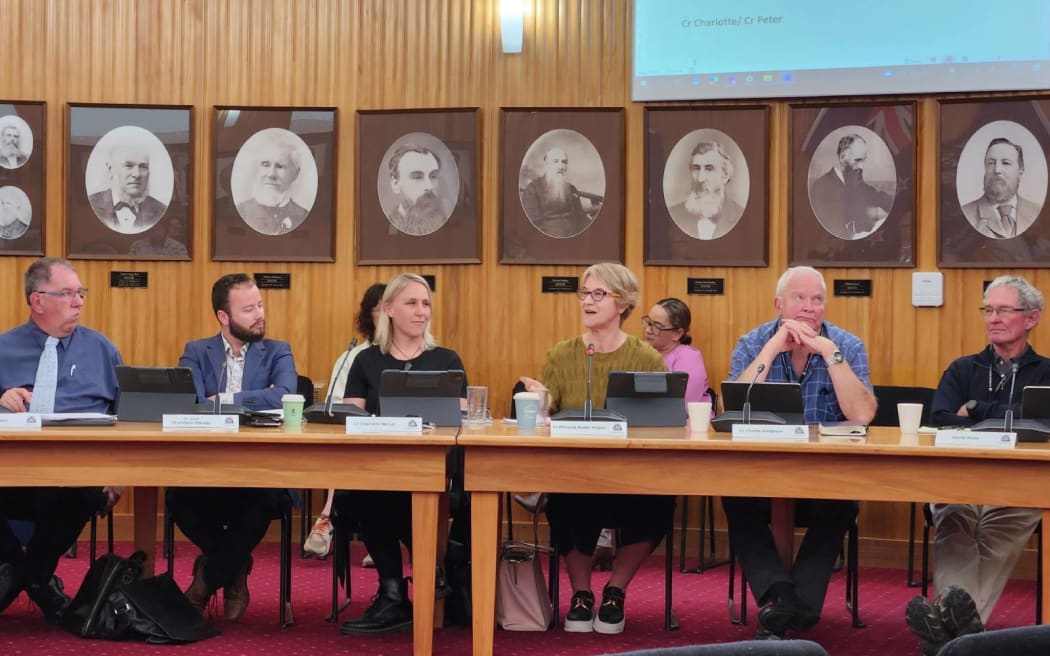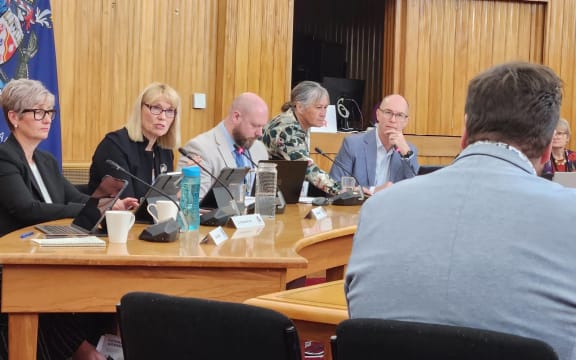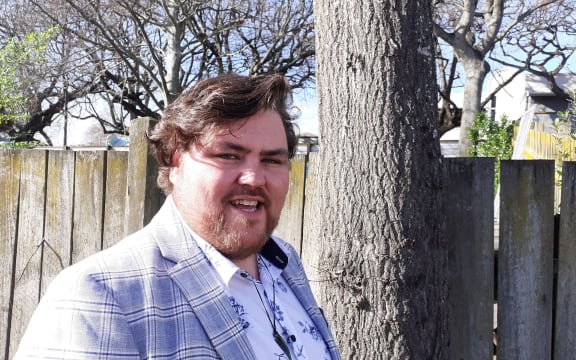
Deputy-Mayor Helen Craig questions Māori wards advocate DC Harding. Photo: Moana Ellis / LDR
Whanganui is to have Māori wards after its council voted 8-5 on Tuesday to introduce them for the 2025 and 2028 local body elections.
Whanganui is the last council in the Manawatū-Whanganui region to establish Māori wards.
Eight of the 13-member council voted in favour of the wards. Voting against were Mayor Andrew Tripe, deputy mayor Helen Craig, and councillors Rob Vinsen, Charlie Anderson and Ross Fallen.
Tripe said many councillors wrestled with their decisions.
“Some were really challenged by this and I would be in that camp as well. No decision is 100 percent right and zero percent wrong, and I found myself in that 50-50 zone, flip-flopping up to today. It was great to have a long weekend to reflect.
“At the end of the day, what I think we all want is representation around the council table from Māori, iwi and hapū. If this is the way we have to get that, then so be it. We’re all for having Māori voice, albeit the system, the legislation, is fundamentally flawed and I believe doesn’t help Māori at all.”

The council will lobby central government and Local Government New Zealand to remove what it says are inequities for Māori arising from Māori ward voting rules.
A key concern raised during consultation was that Māori wards would limit the number of votes those on the Māori electoral roll would have. Voters on the Māori electoral roll will vote only for Māori ward candidates, and those on the general electoral roll will vote for general ward candidates. All electors vote for the mayor.
The council will likely have two Māori wards, based on a pre-set calculation by the Local Electoral Act which looks at the Māori and general electoral population in the city, relative to the number of councillors. This means that Māori roll voters are likely to have two votes while general roll voters could have up to 10.
“We will put a remit [for change] to the LGNZ annual conference at the end of next year,” Tripe said. “It’s a long time to wait, but let’s get on with it right now and lobby central government, especially in their early days as they’re shaping up policy.”
The council also voted to continue working with iwi and hapū to consider alternative options to further enable Māori representation and participation in decision-making.
Tripe said the Māori wards decision was a significant milestone.
“The aim of Māori wards is to provide an opportunity for Māori to be fairly represented on the council. I hope the introduction of Māori wards will increase participation in our democracy and encourage Māori to share their views and aspirations. It will further help our elected members to consider these perspectives when making local government decisions.
“Māori wards do not replace the strong existing relationships the council has with hapū, iwi, mana whenua, tangata whenua, Māori individuals and whānau, and our obligation to consult with these groups and individuals will not change with the decision to establish Māori wards. Instead, they can act as an additional mechanism within the council’s decision-making process.”
Tuesday’s decision followed a month-long community awareness and engagement campaign on the idea of introducing guaranteed seats for Māori at the council table.
The majority of feedback from a survey, meetings, emails and formal letters from iwi and hapū supported establishing the wards. The council’s online survey received 511 responses, 53 percent in favour of Māori wards. Of the survey respondents, 43 percent identified themselves as Māori.
Meetings were also held with key Māori stakeholders, including marae, iwi and hapū. Twenty hapū, 13 marae, two iwi and two rūnanga were invited to give their whakaaro. Letters of support were received from Te Rūnanga o Tamaūpoko, Te Rūnanga o Ngā Wairiki-Ngāti Apa, Te Kaahui o Rauru and five hapū. The meeting noted that Tūpoho remained silent on the subject.
Of those who supported Māori wards, key reasons given were fair and effective representation and bringing Māori voice to council decision-making.

Photo: Moana Ellis / LDR
Those who did not support Māori wards were concerned that separate wards for one ethnicity would be discriminatory and divisive.
The establishment of Māori wards will feed into the upcoming representation review, which addresses how representation is arranged at the council. This review will look at the number of councillors, structure and naming of wards and whether community boards should be retained.
‘Very heartening’
Māori wards advocate Daniel (DC) Harding says he’s excited about what the decision means for Māori.
“I’m very excited for what that means for future candidates and the protection that this will afford them as they go out and campaign, but also to finally be able to engage in a system that shut us out for such a long period of time.
“I’m happy that the majority of [a council of] 13 non-Māori people voted to have Māori at the table. It’s very heartening.”
Harding, who unsuccessfully contested the mayoralty and a councillor seat in last year’s local election, spoke to the council before the vote. He said many of his experiences as a Māori candidate were negative.
“I speak from a personal perspective representing those who have sought to engage in the system but have faced barriers due to their fundamental values, beliefs and assumptions.
“Having contested the previous local body election and supported three people vying for seats in both general and Māori seats in the past general election, I can attest to the stark contrast in the treatment of Māori candidates compared to their general counterparts.

Daniel ‘DC’ Harding. Photo: Local Democracy Reporting/ Moana Ellis
“As a Māori candidate you face not only the usual challenges but also additional scrutiny for championing Māori kaupapa. Last year from the moment my candidacy for this council was announced I was told I was being ‘too Māori’. I was advised that if I wished to secure a seat on the council, that I should refrain from advocating for Māori interests.”
Harding said those aspiring to public office understood the need to defend their policies and positions but should not have to defend their cultural identity.
“The introduction of Māori wards will provide a sanctuary for Māori candidates to advance Māori ideas and advocate for Māori causes without the fear of being marginalised,” Harding said.
After the meeting, Harding said some of the views presented by councillors during the debate showed there was still a lot of work for Māori to do.
“There was a lot of emotion at the table rather than hard evidence. The fact that people think that this decision is divisive… as Māori we do think it is divisive because we can’t get elected into places and spaces such as this. Today’s decision opens up that door. It also opens up the door for our worldview to be front and centre.”
Local Democracy Reporting is Public Interest Journalism funded through NZ On Air.